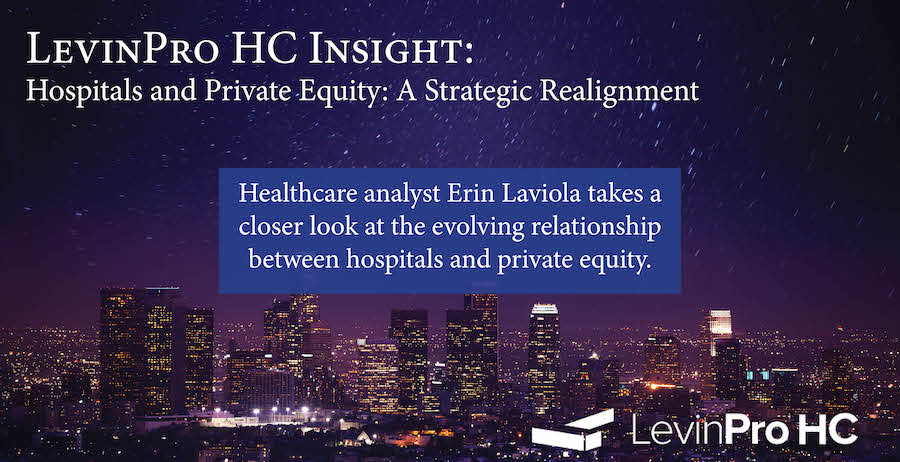
Hospitals and private equity partnerships have created new opportunities for hospital systems to be even more strategic about their operations. One of the recurring themes discussed at the AHLA conference was that many traditional health systems are dealing with cash flow problems – and that partnerships with third-party groups represent a potential solution.
As referenced in our previous article “A Growing Trend: Health Systems Collaborating with Private Equity” in which we focused on major reasons why hospitals and private equity are collaborating, more than half of hospitals (53%) had negative projected operating margins in 2022, with the median operating margin coming in at just 0.9% for the year.
“Undoubtedly, hospitals and health systems do have to get leaner, faster, and stronger,” said Andy Murray, a Partner at Bradley Arant Boult Cummings. “I’ve spent the last several years working with large hospital clients trying to rationalize their portfolios. We figure out which assets they can maintain or grow – and identify the ones in which there are just no efficiencies to be had anymore.”
Balancing patient care needs and economic realities
“If a service line is strategically important, but the hospital isn’t able to create the right amount of value, that’s often a situation where a hospital board will look at a partnership,” Nick Bidwell, a Senior Vice President at Kaufman Hall, explained. The hospital can “maintain connectivity with the service line, share in the growth and development of it, but in many respects, offset a lot of the operational responsibility for it.”
Bidwell focused on home health and hospice as he continued his explanation. “These service lines can generate meaningful margins when done correctly,” he said. “And so a lot of health systems have said, ‘We need to find a partner who knows a lot about what they’re doing in this space and has the scale and back office competencies to translate it locally.’”
Bidwell identified additional service lines that hospitals have been most likely to partner with outside companies on:
- Laboratory services
- Inpatient rehabilitation
- Behavioral health
- Ambulatory surgery
- Long-term acute care
- Home health and hospice
Examples of partnership deals between traditional health systems and private equity-backed platforms:
- Geisinger Health System formed a joint venture with Acadia Healthcare in 2021. Acadia, which specializes in behavioral healthcare services, is backed by Waud Capital Partners.
- NorthShore – Edward-Elmhurst Health formed a joint venture with Residential Healthcare Group in 2022 to offer home health and hospice care. Residential is a division of Graham Healthcare Group, which is a subsidiary of Graham Holdings Company.
In other cases, a hospital board may decide to sell a service line entirely. Rob Gerberry, Senior Vice President & General Counsel for Summa Health, highlighted Summa Health’s decision to sell portions[1] [2] of its outreach laboratory services business to Quest Diagnostics in 2022. According to the Levin Associates database, the deal was an all-cash transaction.
Gerberry described the lab business as a “distraction of management. We knew we’d never scale the business to the level it could be, so we made the decision to commoditize it.”
Gerberry added, “At the same time, we put a lot of deal terms in it to make sure that our physicians and our communities still get their service needs met.”
Partnerships as a defensive strategy
Health systems may also consider partnerships with non-traditional entities as a preemptive, defensive strategy to preserve revenue sources.
Matthew Weiss, a Managing Director at EY Parthenon, pointed out that private equity firms tend to focus on the most profitable specialties for consolidation – such as cardiology, orthopedics, and gastroenterology – while less profitable service lines like endocrinology, nephrology, infectious diseases, and post-acute care are targeted less often.
As of this writing, a search of Levin Associates’ healthcare deal database shows 18 nephrology deals since 2016. There have been 133 gastroenterology deals in the same time frame, the majority of them involving private equity.
“There’s a lot of cross-subsidy that goes on in healthcare systems, where the more profitable commercial business cross-subsidizes Medicare and Medicaid patients. If you strip out the more profitable services from health systems, it’s going to create a really challenging cycle,” Weiss explained.
“I think health systems are trying to get out in front of this by forming these partnerships as defensive moves. I don’t know where it’s all headed, but I think it’s got to be a little anxiety-provoking for the health systems.”
In a separate conversation, Gerberry commented that not-for-profit health systems have a responsibility to provide critical care services, including for the sickest patients. But as patients have more choices about where to seek non-emergency care, it remains to be seen how that will impact non-profit organizations in the long term.
“Our obligation as tax-exempt hospitals is to continue to figure out how to provide these mission-based services. But as the profitable service lines aren’t there anymore to take care of the ones that aren’t profitable, that is the big challenge that we face,” Gerberry said.
“As you see more and more PE assets, more physician-disruptor companies taking away commercial-paying patients, and health systems are left with self-paying and indigent care, it’s going to become a bigger challenge.”
Levin Associates attended AHLA’s Health Care Transactions Conference on April 17-19, 2023, and the insights shared in this post are from panel discussions our writer observed in person and from follow-up conversations with panelists.
Erin Laviola is a writer for Levin Associates.
Levin Associates provides comprehensive coverage of the deals, companies, and trends shaping the healthcare industry. Clients access proprietary M&A transaction data and daily news/analysis through the LevinPro platform. Schedule a demo today to see what LevinPro can do for your team.

